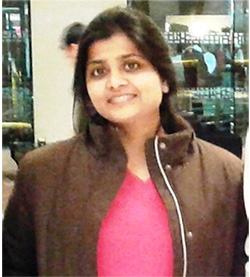A few years ago, Dr Gaganpreet was a Post-Doctoral fellow and worked as Scientist at INST Mohali for some time with limited scope for independent research. But working on a global environmental concern has always remained a passion for her. She had been passionate about it since her early days and always wanted to do research work in this field. However, opportunities were just not coming her way.
As her family was settled in Chandigarh, their responsibilities limited her movement to explore opportunities in science in other cities. She was confused and indecisive about her future. Moreover, she faced challenges in her scientific life due to family responsibilities and the indecisiveness, coupled with family responsibilities, did not let her focus on her research goals.
The Women Scientists Scheme by the Department of Science & Technology (DST) came to her rescue. She came to know about this programme, and it brought her hope and scientific life aspirations back. After becoming part of this programme, she concentrated on her research undeterred. She got a chance to pursue her research in the premier research Institute like Indian Institute of Science Education and Research, Mohali (IISER, Mohali).
The fellowship prepared her for upcoming faculty positions, and she is currently working with Post Graduate Government College for Girls, Chandigarh as Assistant Professor.
“I feel the biggest challenge in women’s scientific life is balancing career and family responsibilities. Combining career and family is not easy, and often compromises have to be made. When I was also caught in such a dilemma, DST’s Women Scientist Scheme provided me with the opportunity to accomplish my research goals,” she says.
“I consider myself fortunate that I am working on toxic gas sensing and water purification techniques. Since sensing toxic gases is crucial in monitoring and controlling environmental pollution as well as in medical and agricultural applications, I believe contribution in these areas will provide the novel methods for the detection of toxic gas molecules with ultrasensitive detection efficiency”, she says.
Dr Gaganpreet strongly believes that this fellowship made her more and confident, and the knowledge gained during this period has empowered her to continue the research.“Because of this programme, I am able to continue my research in the field of gas sensing and water desalination applications. This scheme not only enhanced my employability but also helped me look at things from a different perspective,” she added.
My association with IISER Mohali has provided the resource and healthy environment to do research and my Project Mentor, Dr P. Balanarayan, has been a great help with his insightful discussions, guidance and suggestions. He has been extremely supportive and has given me the freedom to explore different areas,” she added.
“The outcomes of my DST research project will expand enormously the fundamental knowledge of phosphorus-based materials and will open the way to novel applications in sensing areas, Dr Gaganpreet mentioned.
Coming to this point has been a challenge, and she pointed out that she has been able to achieve it by being efficient, selective and flexible.
“Women should believe in themselves and be convinced that all they do matter a lot for science and society. They should be open, realistic and accept all the challenges coming their way. They should appreciate the exemplary courage of eminent women scientists who had overcome several hurdles to contribute to science. If some have done it, then we can do it too. Ultimately, this is your life, and only you can make the difference,” she pointed out.































